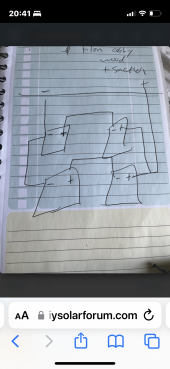Vigo
Solar Addict
That suggests your battery-to-inverter wiring is dropping voltage due to excessive resistance somewhere in that circuit.What i don't understand is when under load the batteries % runs down really quick, but having a meter on each battery still shows the volts stay the same, no v drop. Its like the batterie's are buggered but the voltage stays constant.
If each battery is at 13.0 that would be 26v and your inverter is showing 24 there, suggesting a ~2v drop in the wiring.
It could be a refresh rate issue, though. As in, something is happening very briefly that is overloading the inverter but the simple voltage and load% readouts dont reflect it. The fact that your ac output voltage is varying so much makes me wonder if you have a power factor issue with your heat pump. Some power meters such as the one linked to earlier in the thread will measure PF. If your inverter has a display mode that shows VA of output and it is much different from the Watt number, that would also suggest a power factor issue. Its also possible that the ac output voltage simply becomes that unstable when voltage at the battery input terminals is low, and that it has nothing to do with PF. All needs further testing..
If you have a mutimeter with min/max you could do several things to figure out how much of the problem lies with the batteries vs the wiring. Do you have a meter with a min/max function?



